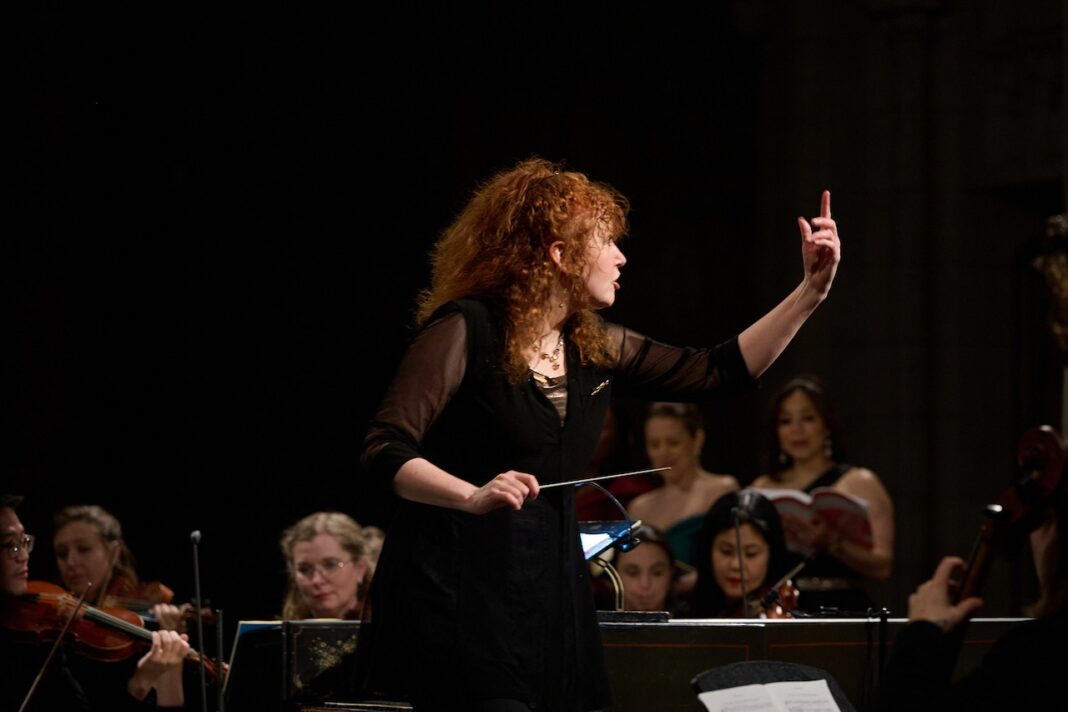CLEVELAND, Ohio – If Mozart had finished his Requiem, or even completed more of it, the fascinating and uncommonly timely program coming up next week at Apollo’s Fire likely would not have come together.
That is to say, if the Requiem were longer, music director Jeannette Sorrell wouldn’t have sought other music to complement it and therefore wouldn’t have woven Mozart’s final work and contemporary music into what is now being called “Tapestry: A Masterpiece Reimagined.”
“This is more adventurous, and I think for us it’s going to be more meaningful,” Sorrell said. “I think creating a program that speaks to people from all walks of life… is something Mozart would approve of.”
Sorrell is probably right about the latter, and almost certainly correct about the former. Mozart was a man of the people, open to experimentation.
Meanwhile, for Apollo’s Fire, specialists in Baroque and early Classical music, a program featuring his music alongside works by living Black composers can hardly fail to hit different.
In lieu of a traditional, albeit glorious mass for the dead, Apollo’s Fire is presenting an open-armed musical embrace, a composite production that gives equal weight to the non-White, non-European experience and invites listeners to find common ground and mutual solace in the effort.
“What makes this program unique is that it is not an attempt to imagine what Mozart might have done,” said soprano Sonya Headlam, one of five guest vocalists slated to take part in the performances, along with the Apollo’s Singers chorus. (The others are soprano Elora Kares, mezzo-soprano Guadalupe Paz, tenor Jacob Perry, and bass-baritone Kevin Deas.)
“It is a woven tapestry of the past and present, as well as of people whose experiences and histories are different yet deeply interconnected.”

Most performances of Mozart’s Requiem are exactly what Headlam described: an act of imagination. They include portions of the work completed not by Mozart, who died before finishing it, but rather by students, contemporaries, or scholars, using sketches.
Apollo’s Fire, of course, is not most groups; It doesn’t perform such creations. But leaving aside those supplements comes at a cost. It leaves Apollo’s Fire with less than 40 minutes of music, about half an evening.
First to help fill out the program, and ultimately to re-define it, was “1791: Requiem for the Ancestors,” a new work commissioned for the occasion from Berklee College of Music professor Eric Gould, highlighting the state of the world outside Austria the year Mozart died. Sorrell called it “spiritually visceral…a requiem from the Black American experience.”
More, though, was needed – a small, period-instrument ensemble has certain limitations – and so Sorrell continued searching.
Out of that quest came the two other works now to be woven through the Mozart: two of “Five Freedom Songs” by Jessie Montgomery and Damien Geter’s “An African American Requiem.” The latter, Sorrell said, is a “masterpiece. People are still finding out about it.”
“It’s grown into a real tapestry program,” said David Walker, managing director of Apollo’s Fire and a singer himself. “It’s a real collaboration of voices that need to be heard and expressed, an experience that audiences should be having.”
On its own, irrespective of the version performed, Mozart’s Requiem is momentous, a peerless work packed with some of the composer’s most sublime and sophisticated material. There’s a reason it’s featured so prominently in the film “Amadeus,” and that so many recordings of it – including one by Apollo’s Fire – exist.
Context, though, is everything, and the “Tapestry” setting in which Apollo’s Fire is presenting Mozart’s Requiem is liable to make the work even more powerful.
By surrounding the Requiem with music penned in response to the Black world in Mozart’s time and beyond, Apollo’s Fire aims to transform the work from a rite for a single person in the 18th century into a grand communal gesture relevant to all of society today. Sorrell said her goal is to foster “a sense of community, a new experience of brotherhood and sisterhood.”
Walker, for his part, said that if he were singing in “Tapestry,” he wouldn’t be daunted by the prospect of alternating between Mozart and contemporary music. Rather, “I would be thrilled with the message we’re trying to share and also with the artistic challenges,” he said.
At least one participant is already touched by the notion, long before any notes have been played or sung. Headlam, the soprano, said she finds this new “iteration” of Mozart’s Requiem “innovative and deeply meaningful to me personally.”
Now it’s her hope listeners feel the same. If successful, “Tapestry” will “carry us through remembrance and grief into a shared space of resilience, hope, and light,” Headlam said. “My hope is that the audience will find it both powerful and deeply moving.”
PREVIEW
Apollo’s Fire
What: “Mozart’s Requiem: A Tapestry”
When: 7:30 p.m. Friday and Saturday, Nov. 7 and 8.
Where: St. Bernard Catholic Church, Akron (Nov. 7) and Severance Music Center, Cleveland (Nov. 8)
Tickets: $10-$85. Go to apollosfire.org or call 216-320-0012.



